Opinion
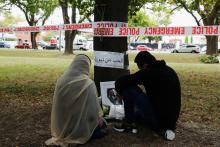
The struggle against hatred is as old as humans, and it will continue after each of us is gone from the planet. But God has given us this moment to join the struggle against the ideologies that that inflict such evil upon our families, our communities and our world.
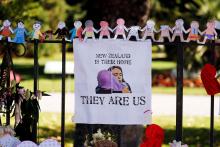
As executive director of the Shoulder to Shoulder Campaign, my professional life is concentrated on counteracting anti-Muslim discrimination and violence. When I started this work, there were many from my white Christian community of origin that wondered if I had converted to Islam — as if that’s why I started doing this work. I understood where the people asking this question were coming from, but the assumption behind it bothered me. They assumed the only reason Christians would care about anti-Muslim hate in the United States is if they had converted to Islam themselves. The assumption caused me to dig deeper into why I would care enough about this issue to devote myself to it not in spite of my Christian identity but because of it.
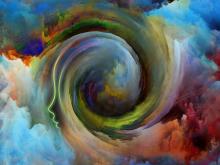
In our faith walk, there is much to celebrate, but insistently characterizing life as a triumphant march from glory to glory can alienate people who don’t find life quite as sunny. Church culture can feel painful for people who deal with various health issues or certain kinds of inner suffering that make it difficult to sense God’s presence. There’s little discussion in church of the “dark nights” that are a normal part of the faith journey, or the fact that such nights can last for years in some cases.
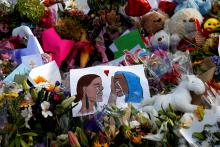
Let me tell you what it’s like to walk into a classroom studying world religions after a mass shooting at a house of worship. I know because I’ve done it twice in six months. Last October, my students and I returned to class after 11 people were gunned down in Pittsburgh during Shabbat services. Last Friday, we awoke to a shooting that killed 50 people during Jumu'ah prayers at a New Zealand masjid.

So where can we find hope, and how can we actually move the needle on climate change? By doing three things: One, Americans should follow a moral compass, not a political one. Two, we must focus on bringing change locally. And three, religious leaders should lead the charge by imploring followers — in churches, synagogues, mosques, or temples — to see the moral and theological imperative of protecting all of God’s creation.

The idea that black and brown students possess the intellectual prowess to compete and succeed alongside their white counterparts is not a myth, it’s a fact. But, historically, black and brown students have not been allowed to showcase this intelligence in institutions of higher education.
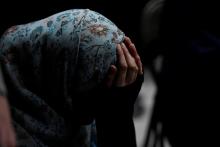
The church has failed to speak out strongly enough against the evils of white supremacy and white nationalism. We have failed to confront it, even name it for what it is. Our complacency has laid the foundation that this act of terror was built on. We can tweet our “thoughts and prayers” and post our condemnation of this vile act but if we don’t examine ourselves, we will continue to be complicit in this atrocity.

On March 8, the U.S. House of Representatives passed the “For the People Act,” a historic piece of ethics and election reform legislation that responds to some of the biggest problems our democracy has experienced in recent times. The bill itself is bold and expansive — sweeping even — in the terrain it covers, and in the marker it lays down for what democratic reform should look like.
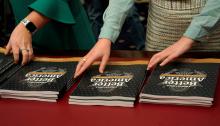
Budgets are moral documents: They signal what and who we prioritize and seek to protect or uplift. As Christians we can disagree on many issues, but it should be hard to argue that there is an overriding call in the Bible to demonstrate a particular concern for the poor and prioritize the welfare of the vulnerable. This is the moral test by which we must evaluate every budget, perhaps most importantly the federal budget. Based on this test, the Trump administration’s proposed budget priorities for Fiscal Year 2020 fails miserably and must be rejected.
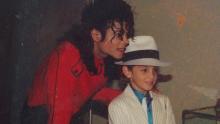
It is a difficult film to watch, but it is not sensationalized in any regard. Reed was not interested in making a film to convince anyone of Jackson’s guilt. Instead, the camera is fixed on both Wade Robson and James Safechuck, the men who are alleging the abuse, and their families. It is an incredibly important experience, and almost disorienting as a viewer, to give so much power to these men and their stories. They describe the reality of what it means to be someone who has survived long-term sexual abuse as a child, at the hands of someone who was much older and infinitely more powerful. The secondary thread running throughout the film is the story of their family members — the mothers, the siblings, the wives — who describe how this type of abuse happens, and how victims are silenced for decades.

Could the United States ever do something so heinous that it would become morally necessary for a foreign military to drop bombs on my house? This is the question that was running through my mind on November 11, 2018, when Montclair Presbyterian Church in Oakland, Calif. —a congregation of around 250 souls who were kind enough to invite me to be their pastor five years ago — voted overwhelmingly to embrace pacifism by declaring itself to be a peace church.

Alicia Akins, a writer based in Washington, D.C., decided to take some of the most painful questions single women seeking marriage ask and seek answers for in scripture. Her ‘Single Ladies Catechism’ consists of 31 questions, one for each day of the month, with answers rooted in the Bible.
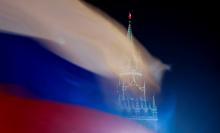
President Donald Trump is convinced he can sweep aside all his high crimes and misdemeanors if Robert’s Mueller’s report finds that Trump never called up President Vladimir Putin and enlisted his help in the election. Whenever the Mueller Report comes out, all Trump wants to do is continue chanting, “No collusion.” He knows that Fox News will join the chorus and expects that the sound of all else will be drowned out, certainly for his base and maybe beyond.
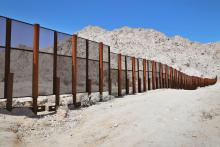
Many privileged American Christians like me are revving up our metaphors of going to the desert with Jesus for 40 days. We’re “fasting” from Facebook, sugar, or alcohol, and taking on a new spiritual practice. But it feels like more of a scandal of disparity this year: Curling up in my cozy home with Lenten meditations on the wilderness while people try to survive crossing literal deserts; not having that glass of wine at dinner while people die of dehydration.

Every International Women’s Day, Sojourners has the honor and challenge of selecting the women who are most inspiring us in the ways they are leading the church, and through it, the world. This year’s group of women includes pastors and artists, professors and activists, lawyers and painters. Collectively, they are shaping the church into a more inclusive, daring, honest, and action-oriented community of believers. We thank them for it. Below, learn why their work is so important, and pray along with these leaders as you receive their blessings for 2019.

This Lent, I urge you to:
- Create a book club.
- Gather with a few friends over coffee and talk through ideas of decolonization.
- Challenge yourself at home and in the workplace to fight toxic stereotypes.
- Re-educate yourself about the history of the United States and the church’s role in empire.
- Grieve, and don’t be afraid of what the wilderness might show you.
Books are always a great place to begin the journey.

Timing is important. Sometimes timing is everything. That may be true now with the likely release of Special Counsel Robert Mueller’s report on President Trump and his campaign’s possible coordination with Russia during the 2016 election season and potential obstruction of justice. It seems the report is likely to be delivered to Attorney General William Barr during the Christian liturgical season of Lent. This Lent a group of Christian elders have issued a pastoral letter calling for “prayer, fasting, and action,” all of which are appropriate for the Lenten season but are also particularly well timed this year to anchor us for a potential national and even constitutional crisis.

Scripture reminds us that we’re formed from the dust of earth and thus bound intimately to all creation. Science describes how in our elemental form, we’re made of the same stuff as everything in the universe. Yes, we’re earth dust and star dust, too. Everything follows a path of endless transformation.
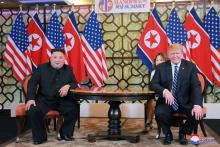
I worshipped at Seoul’s Myungsung Presbyterian Church, the largest Presbyterian church in the world with a membership close to 100,000, and preached at its English-speaking service. At the main Korean worship service I attended (one of five services that they offer each Sunday), I heard prayers for the reunification of Korea at least three or four times, which is a repeated intercession. Moreover, Myungsung is known for its daily prayer services. One of these gatherings that takes place every Monday is focused on praying for re-unification. It has been doing so for 10 years, normally drawing about 3,000 people.
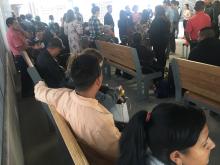
Luisa bought a ring for her daughter Katherine’s quince. She hopes to give it to her in a few months on her 15th birthday. But just in case she is not able to do so, she mailed it ahead of time to friends in the U.S. The two were separated on Christmas Day 2017 at the U.S.-Mexico border.